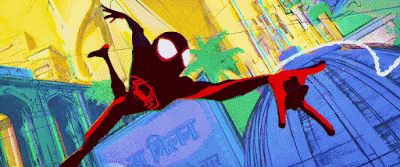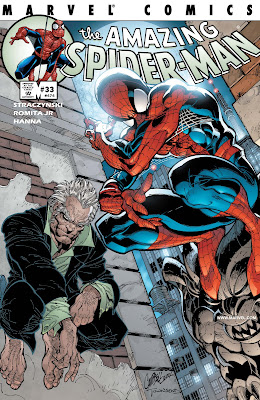"Yeah, I think it's a Banksy."
That about sums it up right there. This movie is a madcap powderkeg of scintillating artistic brilliance.
Minor spoilers!
I also found it to be a bit of a mixed bag for various reasons. None of these reasons really take away from the insane amount of hard work and talent that went into this movie, which you can see popping off nearly frame, but they did lessen my overall enjoyment somewhat. Now you bear witness to my tentative critiques and unintentional backhanded compliments.
This time around in the Spider-Verse, Miles Morales — Earth-1610's Spider-Man — has to deal with the Spot (Jason Schwartzmann), a lesser-known member of the rogues gallery who happens to fit very neatly into the multiverse plot of these films: He's basically a guy made up of inter-dimensional "holes." At first, this leads to some wildly imaginative and spectacularly animated fight scenes between Miles and Spot. Then it gets complicated when Spot starts invading other dimensions and increasing his power, which draws Miles into a bigger web of intrigue as he reunites with Spider-Gwen, his friend, love interest and alt-world variant.
It's revealed that Gwen and the other webheads from the previous film have joined a collective of Spider-People from alternate universes. They are led by Miguel O'Hara/Spider-Man 2099 (Oscar Isaac), who stands apart by being driven and ruthless as opposed to a fun-loving smartass like the majority. Despite how dire he is, Miguel raises the metatextual nature of the movie by explaining Canon Events. For us nerds, "canon" refers to aspects of a certain fictional lore that remain consistent across differing adaptations and interpretations. These turn out to be an integral part of the Spider-Verse, with each Spider-Person being defined by certain Canon Events that apparently must never be altered, for the good of the multiverse. Things get serious when its revealed that joining the club would require Miles to make a fateful sacrifice.
The plot gets increasingly convoluted from there, I'll get to that soon. The real joy of this film is obviously the animation, the action, the sheer passion and exuberance that went into making it. It's an epic of sight and sound as beautiful as one could want from a movie like this. Still, based on that alone, it may be not for everyone; when this movie picks up the pace, it can be hard to keep track of things. That's sort of the fun, though, the frenetic speed and energy of Spider-Man multiplied many, many times over.
It helps that many of the variants have a fairly distinct art style that separates them from each other. This variety bleeds over into the worlds of each variant. Spider-Man India and his world have this richly textured oil painting look, while Gwen's world is washed out in deep pastel shades like moving watercolor. The most creative is probably Hobie Brown/Spider-Punk, who is like a living embodiment of subversive punk rock zine art, constantly shifting to signify his nonconformist personality.
Viewers might find the overabundance of Spider-People charming or annoying; I personally feel less is more, but again this is part of the plot thing I'm getting to. As opposed to the small and quirky squad from Into, they throw just about everything at the board in Across. Damn near every version of Spider-Man appearing in film, cartoon, video game or comic. As a fan, it certainly tickled my nostalgia bone, but it also got to feeling a bit like Ready Player One after awhile.
Now let's get to the plot. Across the Spider-Verse joins Avengers: Age of Ultron and The Dark Knight Rises in the hall of fame of bloated superhero movie sequel plots. Part of me has to admire the ambition, but mostly it just felt like too much at times.
I mean, this covers a lot. It continues the saga of Miles and his struggles with being Spider-Man, but we also have Gwen as a deuteragonist and her struggles with being Spider-Woman. There's also the budding romance between the two that colors much of the story. Then there's Spot's antagonist arc, and Miguel O'Hara's hero-antagonist arc. There's also Peter B. Parker and all the new Spider-People. It's trying to deconstruct the theme of responsibility that defines Spider-Man, at the same time mixing that up with a little philosophical parable about determinism and free will. And there's a whole other layer to the story that doesn't come up until the end of the movie. All of this is left up in the air, as the movie concludes with a (fairly well-executed) cliffhanger.
I'm also not one-hundred percent on the characterization this time around. Much is made here about the fact that being Spider-Man/Woman/whatever is an isolating life, because no one else knows what it's like to dress up in a funny costume, do amazing acrobatics while fighting crime, lie to everyone they care about, and inflict relentless drive-by sass on helpless urbanites. This is why pretty much all of them end up flocking to the Spider-Society, which comes off like a pseudo-cult full of lonely spider-themed weirdos who all enable each others' hero complexes. This was interesting, but it felt off.
And this splinters out to many characters... with one alter-ego. It just felt wrong seeing virtually every Spider-Man except Miles go along with the idea that letting their loved ones die is necessary to preserve order i.e. ensure that Spider-Man exists. This makes them all antagonistic at a certain point. Additionally, it is pretty lame to see, again, virtually every Spider-Man fail to take down a single Spider-Man who is technically the least experienced; not only that, he outsmarts them all too. Of course, it might make sense by silly comic book standards as well as Spider-Man standards (his tendency to fail miserably is part of why he's a compelling hero), but I think it took things a bit too far.
Then there's other things that weren't taken far enough. Due to the cliffhanger, we don't really get a conclusion to Miles and Gwen's story of shared teen angst. What we get here — apart from all the action and plot-heavy stuff — is them bonding over being free spirit vigilantes while indignantly snubbing their parents because they're afraid to reveal their secret identities to them; Gwen at least gets some resolution, but not Miles... yet.
I titled this review as such because I could not shake the feeling of deja vu I felt while watching this movie.
Into the Spider-Verse established a hero and the complex world he plays around in. Now we have the anticipated sequel that takes all of the previous film's lauded effects even further, but also takes a deep dive into mythology, fundamentally altering our previous conceptions of the story and setting, ultimately leaving many plot-threads and character arcs hanging with a "to be continued" ending. I could not help but be reminded of seeing The Matrix: Reloaded back in 2003.
The plots of each film are different, but Across the Spider-Verse left me with a similar sensation. Of being absolutely dazzled and discombobulated by what I saw, and not being fully satisfied because it turned out to be half of a two-part story rather than its own self-contained thing; both movies also have twist-endings on top of cliffhangers.
Part of me fully expects that my opinion of this movie will improve (as it did with Reloaded) once I have seen the third film, rounding out the story this one was telling. However, for the moment, it is a mixed bag for me. Not quite the sum of its parts, though it really can't be denied that it is a marvel of cinematic animation. Once again, for all my criticisms, I do think this movie is a genuine work of art.
Spider bites:
* Interestingly, the creators of the film weren't originally planning to have the Spot as the villain. I'm not sure who they would have chosen then, since I imagine it would have been a bit of a different movie if they went with any villain but Spot. Or maybe the original idea was just to have Miguel O'Hara as the main antagonist.
* While it sucks that the Spot is just kinda... there, even more than the last movie's villains, I appreciate that this is a superhero film where the superhero is the star. So often it's the villain who steals the show in these things.
* I always thought Spider-Man 2099's suit was gnarly, but it looks so damn good here with its intense neon hues.
* Favorite part of the movie is probably the extended action sequence in Mumbattan, Pavitr Prabhakar/Spider-Man India's fantastical stomping grounds.
* Once again, even with all the actors playing Spider-People, I thought the most compelling voice performances were from Brian Tyree Henry and Luna Lauren Velez as Jefferson and Rio Morales. I also could have used a bit more Jake Johnson as Peter B.
* Jack Quaid briefly voices the Peter Parker from Gwen's universe, who died after he turned himself into the Lizard because he wanted to be special, like Gwen. Reminded me a bit of Quaid's character from The Boys.
* The quickly glimpsed Spider-Man psychiatrist is listed as Ezekiel Sims. He's a slightly obscure figure who happened to be integral to the first Spider-Man comic I ever read. Having him as the psychiatrist was a nice little easter egg, since his original character (as I recall) is an older and wiser guy who has Spider-Man's abilities but understands them far better than he does.
Quotes:
Spot: "I created you. You created me."
Jefferson Morales: "Spider-Man, why'd you create that guy?"
Miles Morales/Spider-Man: "I didn't! He's talking crazy!"
Miles: (watching a building sink into a blackhole) "What is that?"
Hobie Brown/Spider-Punk: "It's a metaphor for capitalism."
Miles: "This is unbelievable."
Gwen Stacy: "Um, this is the lobby."
Gwen: "Welcome to... Spider-Society."
Miguel O'Hara: "You have a choice between saving one person, and saving an entire world, every world. To me, that's an obvious choice."
Miles: "I can do both! Spider-Man always—"
Peter B. Parker: "Not always."
Miles: "Everyone keeps trying to tell me how my story is supposed to go. Nah. I'ma do my own thing."
Still a bit undecided on this one. Just wasn't feeling it as much this time. Into was just such a well-calibrated buzz, whereas Across was more like a sudden overdose. Let's say my ADHD-addled inner child was head over heels, but my cynical adult self was less taken with it. Three out of five canon events.




Confusing indeed. I think you'll find that Miles Morales is from Earth-1610. He was bitten by a spider that had slipped through from Earth-42.
ReplyDeleteYup, got mixed up. Will correct it. Thank you, Anonymous.
ReplyDelete